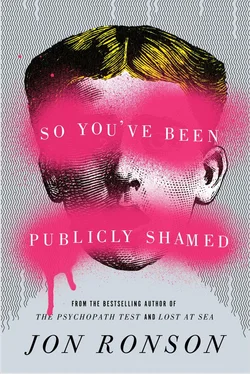— DAVID VOREACOS, Bloomberg Businessweek , MAY 23, 2012
All charges against Phineas had been dropped. And so that was that. Except Graeme never bothered to cancel his Phineas Upham Google alert. Which was how he began to notice the strange accolades. Phineas was suddenly garnering a lot of them. He was appointed “Head Finance Curator of Venture Cap Monthly,” whatever that meant. “Charity News Forum” voted him “Philanthropist of the Month.” He started writing for a magazine Graeme had never heard of called Philanthropy Chronicle . He published a collection of essays. He even created a magazine to “bring philosophy writing to underprivileged youth by making it part of nonprofit educational programs in developing nations.”
But, as Graeme would write, “something was wrong with these sites, which in every case looked flimsy and temporary, especially when you got beyond the first page.”
When I went to the street address listed for the [ Philanthropy Chronicle ] magazine’s offices, I discovered that 64 Prince Street did not exist — or, rather, that it is a back entrance next to an Indian restaurant.
What had begun as a schadenfreude-motivated Phineas Upham Google alert had led Graeme into the mysterious world of “black-ops reputation management.” The purpose of the fake sites was obvious — to push reports about the tax-evasion charges so far down the search results that they’d effectively vanish. Nobody had heard of the European Court of Justice’s “Right to Be Forgotten” ruling at that point — it was still two years from existing — but somebody was evidently fashioning some clumsy homemade U.S.-based version for Phineas Upham.
Graeme had a skill most people don’t. He knew how to attain clues from HTML codes. So he dug into them, “looking for evidence of a common author.” And he found it. The fake sites were the work of a man named Bryce Tom, the head of a business called Metal Rabbit Media. He was a young Californian living in New York City.
The two men met in a café, Graeme thrilled to have exposed the mother lode, Bryce Tom evidently plagued with anxiety.
“This could be very bad for me,” he said, visibly shaken. “No one’s going to want my business.” We stared at each other in uneasy silence for a few minutes, and I fetched him a nonalcoholic sangria to calm him down. When I returned, Tom had shredded his napkin.
— GRAEME WOOD, “SCRUBBED,” New York MAGAZINE, JUNE 16, 2013
I found Graeme’s story strange and enthralling except for this last part. Bryce Tom had seemed in such despair that he’d been exposed, which made for a melancholy ending.
—
And now Graeme and I sat opposite each other in a New York City café. I told him I hadn’t a clue that people like Bryce Tom existed and I wanted to do some digging of my own. Graeme gave me leads: names of men and women he suspected might be Metal Rabbit clients, like a highly decorated UN peacekeeper who had twice been blown up in suicide bombings. Back home, I read articles about how, on both occasions, bleeding from shrapnel wounds, this UN peacekeeper stayed to help the wounded and the dying. The stories were full of eulogies, tributes to his bravery, “but his Wikipedia page has been edited by a man I know works for Metal Rabbit,” Graeme had told me. And after an hour of hacking through Google’s undergrowth, I found a site accusing the peacekeeper of being a philanderer, cheating on three women at the same time, a “low life prick,” and a “pathological liar [whose] behavior is demonic.” When I e-mailed him to ask if he was a Metal Rabbit client, he obliquely replied that he wasn’t but “I do know the guys.”
Like Graeme Wood, I was having fun exploring the Google search pages nobody ever goes to for secrets that would otherwise go unnoticed, but then I met Justine and heard about Lindsey, and I read Graeme’s article a second time and saw a different side to it. It was miserable that 99 percent of us could never afford a service like Metal Rabbit, and it was intriguing and scandalous that people like Bryce Tom went about their business in such a shadowy manner. Metal Rabbit deserved exposure. But Phineas Upham had been cleared of all charges. Surely he had a right to be forgotten? Didn’t he?
I e-mailed Bryce Tom, “Is Metal Rabbit Media still operational?”
He e-mailed back, “What can I help you with?”
I e-mailed him back, “I’m a journalist…”
I never heard from him again.
• • •
The Village Pub in Woodside, near Menlo Park, Silicon Valley, looks like no big deal from the outside, but when you get inside, you realize it’s massively upmarket and filled with tech billionaires — the restaurant version of the nonthreatening clothes the tech billionaires were wearing. I told my dining companion, Michael Fertik, that he was the only person from the mysterious reputation-management world who had returned my e-mail.
“That’s because this is a really easy sector in which to be an unappealing, scurrilous operation,” he said.
“Scurrilous in what way?”
“A couple of them are really nasty fucking people,” Michael said. “There’s a guy who has some traction in our space, who runs a company, he’s a convicted rapist. He’s a felony rapist . He went to jail for four years for raping a woman. He started a company to basically obscure that fact about himself, I think.” Michael told me the name of the man’s company. “We’ve built a data file on him,” he said.
Michael’s competitors were disreputable, he said, and so were some of his potential clients.
“Very early on, within two weeks of launching our website in 2006 [Michael’s company is called Reputation.com] I remember being by myself and getting a couple of sign-ups from guys. So I googled them. They were pedophiles.”
“Do you remember the pedophiles’ names?” I asked Michael.
“Of course not,” Michael said. “Why do you ask that shit?”
“I don’t know,” I said. “Curiosity.”
“No, it’s prurient curiosity of the type you condemn in your book,” Michael said.
—
Michael looked different from our fellow diners. I didn’t recognize any of them, but everyone seemed insanely rich — preppy, with faces like luxury yachts, like Martha’s Vineyard in the summertime, WASPy and at peace with the world, practically floating through the restaurant, whereas Michael was a big, angry, coiled-spring Jewish bear of a man. He was born in New York City, attained a degree from Harvard Law School, and invented the concept of online reputation management while working as a clerk for the Sixth Circuit of the U.S. Court of Appeals in Louisville, Kentucky. This was the mid-2000s. Stories about cyberbullying and revenge porn were just starting to filter through. And that’s how Michael got the idea.
—
After he turned the pedophiles down, Michael told me, he noticed he was getting sign-ups from neo-Nazis, albeit repentant former ones— “When I was seventeen I was a Nazi. I was an asshole kid. Now I’m in my 40s I’m trying to move on but the Internet still thinks that I am a Nazi.” They were more sympathetic than the pedophiles, but Michael, being Jewish, still didn’t want them as clients. So he drew up a code of conduct. He wouldn’t accept anyone who was under investigation or had been convicted of a felony violent crime, or a felony fraud crime, or any sexually violent crime, or anyone accused — even informally — of a sexual crime against children. And, he said, there was another moral difference between him and his competitors. He wouldn’t invent fake accolades. He’d only put the truth up there. Although “I don’t think it’s incumbent on anyone to do massive fact-checking.”
Читать дальше












